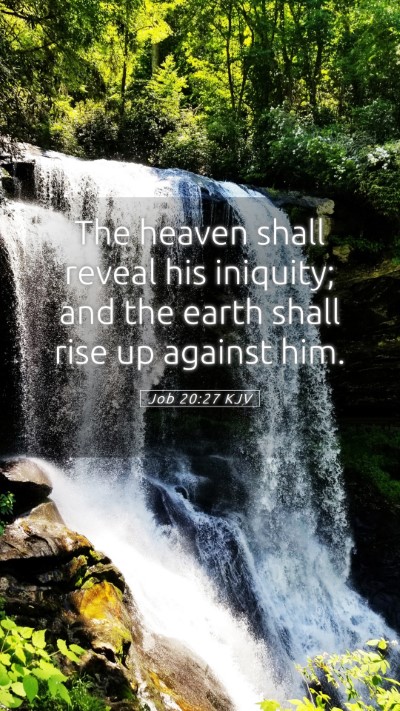Old Testament
Genesis Exodus Leviticus Numbers Deuteronomy Joshua Judges Ruth 1 Samuel 2 Samuel 1 Kings 2 Kings 1 Chronicles 2 Chronicles Ezra Nehemiah Esther Job Psalms Proverbs Ecclesiastes Song of Solomon Isaiah Jeremiah Lamentations Ezekiel Daniel Hosea Joel Amos Obadiah Jonah Micah Nahum Habakkuk Zephaniah Haggai Zechariah MalachiJob 20:27 Meaning
What is the meaning of Job 20:27?
The heaven shall reveal his iniquity; and the earth shall rise up against him.
Job 20:27 Bible Verse Meaning
Understanding Job 20:27 - A Comprehensive Commentary
Job 20:27 states:
"The heaven shall reveal his iniquity; and the earth shall rise up against him."
Overview of Job 20:27
This verse is part of Zophar's response to Job, emphasizing the ultimate judgment that awaits the wicked. The passage illustrates the divine principle that evil will ultimately be revealed and punished, a theme echoed throughout Scripture.
Verse Meaning
The combined interpretations from various public domain commentaries shed light on the depth of this verse.
Matthew Henry's Commentary
Matthew Henry explains that this verse signifies how God will disclose the sins of the wicked. He points out that Zophar emphasizes that not only will heaven bear witness against the sinner, but also the very earth he walks upon will testify to his deeds. This serves as a reminder that nothing is hidden from God's sight, and every action will eventually face divine scrutiny.
Albert Barnes' Commentary
Albert Barnes elaborates on the imagery of heaven and earth revealing iniquity. He notes that Zophar's declaration indicates that while the wicked may prosper for a time, their secrets will eventually be exposed. Heaven symbolizes God's authority, while the earth represents the created order, both participating in judging the wicked. Barnes stresses the inevitability of sin's consequences and God's ultimate justice.
Adam Clarke's Commentary
Adam Clarke provides a historical context, noting that Zophar's assertion speaks to the conscience of mankind. He argues that the 'heaven' referred to is not only a metaphor for divine justice but also a reminder that our own conscience serves as a witness to our actions. Clarke emphasizes the futility of trying to escape the moral reality of one's actions in light of God's omniscience.
Key Themes and Insights
- Judgment and Accountability: The central theme is the accountability of the wicked, highlighting that divine justice is inevitable.
- Nature as Witness: The earth and heavens serve as witnesses to human actions, underscoring the belief that all sin is ultimately exposed.
- Reassurance for the Righteous: This verse reassures the faithful that the apparent success of the wicked is temporary and that justice will come.
Related Bible Verses
- Numbers 32:23 - "But if you will not do so, behold, you have sinned against the LORD; and be sure your sin will find you out."
- Psalm 37:20 - "But the wicked shall perish, and the enemies of the LORD shall be as the fat of lambs; they shall consume; into smoke shall they consume away."
- Ecclesiastes 12:14 - "For God will bring every deed into judgment, including every hidden thing, whether it is good or it is evil."
Applying the Verse to Daily Life
Understanding Job 20:27 provides valuable insights for practical living. It encourages believers to live with integrity, knowing that actions have consequences. It serves as a reminder that while the world may appear unjust, God’s justice prevails. Reflecting on this verse can promote accountability and righteousness in personal conduct.
Conclusion
Job 20:27 illustrates a profound truth about the nature of divine justice and accountability. The insights gathered from Matthew Henry, Albert Barnes, and Adam Clarke enrich our understanding of Scripture, illustrating both the human and divine dimensions of sin and justice. For those participating in Bible study groups or seeking to deepen their Bible study insights, this verse serves as a poignant reminder of the importance of living a righteous life.


